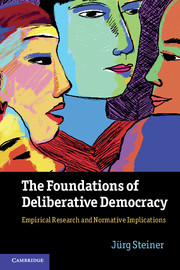Book contents
- Frontmatter
- Contents
- Figures
- Acknowledgments
- Introduction
- 1 Citizen participation in deliberation
- 2 Rationality and stories in deliberative justification
- 3 Common good and self-interest in deliberative justification
- 4 Respect in deliberation
- 5 Public openness of deliberation
- 6 Force of better argument in deliberation
- 7 Truthfulness in deliberation
- 8 Deliberation in the media and the Internet
- 9 Favorable conditions for deliberation
- 10 Favorable consequences of deliberation
- 11 The praxis of deliberation
- Appendix Newest version of Discourse Quality Index (DQI)
- Index
- References
6 - Force of better argument in deliberation
Published online by Cambridge University Press: 05 August 2012
- Frontmatter
- Contents
- Figures
- Acknowledgments
- Introduction
- 1 Citizen participation in deliberation
- 2 Rationality and stories in deliberative justification
- 3 Common good and self-interest in deliberative justification
- 4 Respect in deliberation
- 5 Public openness of deliberation
- 6 Force of better argument in deliberation
- 7 Truthfulness in deliberation
- 8 Deliberation in the media and the Internet
- 9 Favorable conditions for deliberation
- 10 Favorable consequences of deliberation
- 11 The praxis of deliberation
- Appendix Newest version of Discourse Quality Index (DQI)
- Index
- References
Summary
Normative controversies in the literature
When Jürgen Habermas postulates “the unforced force of the betterargument,” he goes to the very core of the deliberative model. Theessence of the statement is that political decisions should be based on goodarguments. What constitutes a good argument is not a priori given but must befound out in mutual discussion where everyone has an equal voice. As John S.Dryzek puts it, “no individuals may possess authority on the basis ofanything other than a good argument.” The controversy concerns thequestion of to what extent reasonable people can agree what the best argumentsare and therefore what the probability of consensus is. Habermas expresses hopethat consensus is possible when he writes that “consensus brought aboutthrough argument must rest on identical reasons that are able to convinceparties in the same way.” Joshua A. Cohen also emphasizes that“ideal deliberation aims to arrive at a rationally motivatedconsensus.” Note that neither Habermas nor Cohen argue that deliberationwill always lead to consensus; they merely express hope that this may be thecase. In a pragmatic way, they also accept that sometimes consensus may be basedon different reasons. Michael A. Neblo goes a step further in pointing out thatin the interest of pluralism it may sometimes even be better if actors offerdifferent reasons for a specific policy because this may lead to a morelivelydebate. As an illustration he mentions that a coalition to eliminateagricultural subsidies for growing corn may mix those who support the measureprimarily on grounds of economic efficiency and those who support it primarilyout of environmental concerns. For Neblo there is nothing wrong from adeliberative perspective if such a coalition forms.
Information
- Type
- Chapter
- Information
- The Foundations of Deliberative DemocracyEmpirical Research and Normative Implications, pp. 139 - 152Publisher: Cambridge University PressPrint publication year: 2012
References
Accessibility standard: Unknown
Why this information is here
This section outlines the accessibility features of this content - including support for screen readers, full keyboard navigation and high-contrast display options. This may not be relevant for you.Accessibility Information
- 3
- Cited by
